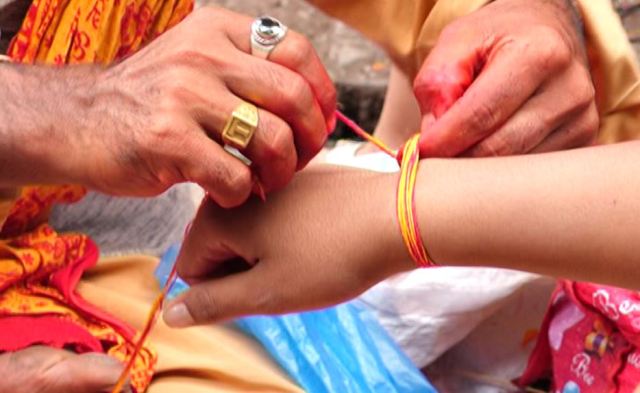Kathmandu: Today, Nepal is observing the annual Janai Purnima festival with traditional practices, including the changing of Janai (sacred thread) and tying of Raksha Bandhan (protection thread). According to the Nepal Panchang Decision Development Committee, individuals holding high administrative positions or those in the government should change their Janai and tie Raksha Bandhan only after 1:30 PM today. Others are not required to adhere to this specific timing.
On Janai Purnima, followers of Vedic Sanatan Dharma participate in rituals by bathing in rivers, ponds, and other water bodies. They then receive the Raksha Bandhan, or protection thread, from their gurus or priests. This thread, imbued with mantras, is tied around the wrist to protect against negative elements.
Dr. Vasudev Krishna Shastri, an expert in religious scriptures, noted that Janai Purnima is also the day for Brahmins, Kshatriyas, and Vaishyas to change their Janai. The Raksha Bandhan is believed to provide protection from negative forces when properly chanted and tied by a priest.
The practice involves early morning visits to water bodies where participants perform rites using barley, sesame seeds, and kusha grass. This is followed by the Rudrabhishek ceremony, in which new Janai is worn. The day is also known for honoring the eight sages: Arundhati, Kashyap, Atri, Bharadwaj, Vishwamitra, Gautam, Jamadagni, and Vashistha, hence the term Rishitarpani.
Festivities are taking place in Kathmandu’s Pashupatinath Temple, Ashok Vinayak in Basantpur, and along the Bagmati River, among other temples and holy sites. Celebrations are also underway in various regions including Gosainkunda in Rasuwa, Kumbheshwar in Lalitpur, Panchpokhari in Sindhupalchok, Janakpur in Dhanusha, and others.
In the Terai-Madesh region, sisters are tying Rakhi on their brothers as part of the celebration, symbolizing the strengthening of sibling bonds.
Additionally, it is customary to consume Kwati, a traditional mixed bean soup, which is believed to prevent illness, cleanse the body, and provide warmth during the rainy season, as per religious and Ayurvedic traditions.
